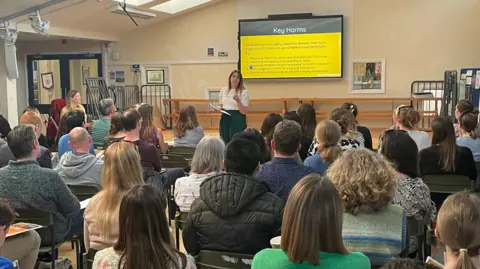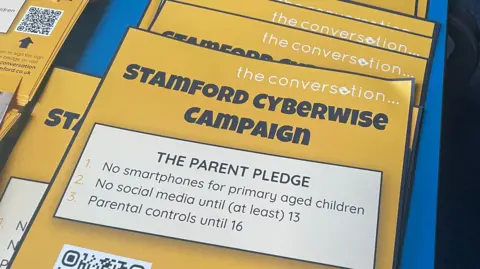 BBC
BBCParents in a Lincolnshire town have been asked to sign a pledge not to give their children a smartphone before the end of primary school.
The Stamford Cyberwise Campaign is encouraging parents to limit children’s access to digital devices and to bar them from social media until they are at least 13, amid concerns about the potential impact on children’s mental health.
More than 200 parents in Stamford have signed the pledge so far and 220 people have signed up to attend workshops at seven primary schools.
The campaign is being run by The Conversation, which was set up by former teachers Gemma Holbird and Sarah Jane Sauntson and promotes child wellbeing.

Mrs Holbird, who is also a mother-of-three, said: “It’s really tough because children will often come home saying they’re the only one who doesn’t have a certain device, but we need a significant parental and cultural shift, so that children don’t come under that pressure.”
Sixty parents attended one of the workshops at Malcolm Sargent Primary School, including mother-of-two Keisha Facer, who said she was there to find out more about how to deal with issues around mobile phones.
“I know a lot of kids now have mobile phones in primary school and I don’t know how I feel about it. I really want to avoid that,” she said.
Magdalena Kaminska has a six-year-old son who doesn’t have a mobile phone but said she expected him to eventually want one.
She added: “I want to be prepared and I don’t want to cause more harm by restricting it too much. I want to learn to have a healthy balance with it.”
 Suzy Lawson
Suzy LawsonThe Netflix drama Adolescence has sparked a national conversation about the impact of social media and smartphones.
There have been similar campaigns in other parts of the UK, including Smartphone Free Childhood, which said more than 80,000 people have signed up to a pact to delay giving children a mobile phone until they are at least 14.
Research by the online safety regulator Ofcom found that nine in 10 children own a mobile phone by the time they reach the age of 11, and nearly three quarters of teenagers between 13 and 17 have encountered one or more potential harms online.
The Stamford Cyberwise Campaign is currently focussed on schools in the town, but the organisers said they were planning to extend it to other areas of Lincolnshire.



